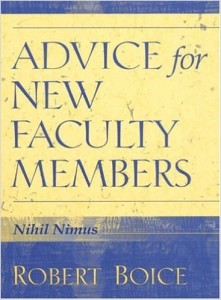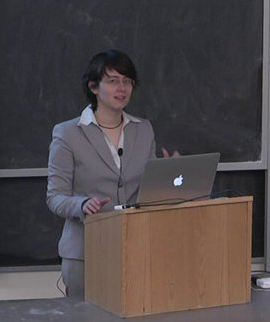 I recently finished reading the book “Advice for New Faculty Members” by Robert Boice. It was recommended to me by Jeff Hancock during his visit to University of Minnesota and it was so helpful that I would be remiss if I didn’t pass along the advice to others. Some of you will be starting your faculty positions in the Fall (I wish I had read this book when I started), but I certainly found it helpful even though I’ve already been at this for a year.
I recently finished reading the book “Advice for New Faculty Members” by Robert Boice. It was recommended to me by Jeff Hancock during his visit to University of Minnesota and it was so helpful that I would be remiss if I didn’t pass along the advice to others. Some of you will be starting your faculty positions in the Fall (I wish I had read this book when I started), but I certainly found it helpful even though I’ve already been at this for a year.
This book is different from other sources of advice in that the insight comes not from Robert Boice’s own experiences, but rather from a series of empirical investigations of “quick starter” new faculty members. While there are several places you can find reviews of the book and summaries of some of its lessons, I wanted to focus on three pieces of advice in this book that I’ve found most surprising and most helpful (so far) in integrating into my own work practices:
- The power of 15-minutes daily. As a new faculty member, many people gave me the advice to make time for writing. I did my best, trying to squirrel away entire afternoons or days for writing. However, I always found that other things came up, eating away at that time. When planning for a whole afternoon but ending up with only thirty minutes, I felt dejected and that it wasn’t worth attempting to get any serious writing done in that period of time. Instead, this book recommends planning to spend 15-30 minutes on pre-writing (e.g., outlining, brainstorming) and writing practices daily. This also mirrors great advice on making use of workable “bits” that I had previously read from Nick Feamster’s research practices blog. I was dubious as to whether this would work for me (“Isn’t there a cost in switching contexts in writing?” I thought), but trying it for a month, I found myself producing more consistently (in July: co-writing a 12-page grant, rewriting a journal paper that needed major revisions, and co-writing significant revisions for a CSCW paper) and less painfully.
- Asking for feedback early and often. Boice recommends this practice for teaching, research, and service. I had already heard this advice for teaching during my orientation at U of M. Indeed, asking students and visiting faculty for feedback early and often led me to change my class to be more useful to students. Coincidentally, the advice counseled me to limit the amount of material covered each class, which also meant less time that I spent preparing for each session (which is a practice this book encourages for new faculty). However, in research, I have had a harder time asking for early feedback on in-progress papers and research ideas. This coming year, I am committed to finding at least two people to serve as a sounding board on each of my major projects. I suppose this piece of advice is not actually that surprising, but for some reason I never thought about extending the value that I got from getting frequent teaching feedback to the potential value I could get from getting frequent research feedback.
- Stopping or pausing as a way of increasing productivity. This seemed really counterintuitive to me — how could stopping when I’m “on a roll” lead to more productivity? Previously, when I wrote and I got going, I’d try to really get as much as I could, squeezing every last word out of the moment. However, I failed to realize that this would inevitably lead to not wanting to write the next day and having a hard time starting next time I write. Of course, I didn’t want to start again: I was rewarding each start with a grueling 12-hour workday and I was ending when I was completely out of momentum! This lesson also mirrors Al Franken‘s advice to writers to “Park on the down-slope,” to make it easy to start again. During the past month, I’ve made an effort of stopping each writing session after 30 minutes, even if I am in the middle of a sentence, this has really helped me maintain the practice of daily writing and led to overall increases in the amount of writing I have done.
I’m sure others may find the bits I pulled out obvious but find value in other aspects of the book. Regardless, I definitely recommend this book to others (if you’re at U of M, I have a copy to borrow) and would love it if you could share the bits that you found to be most surprising, interesting, or useful to your work practices.

